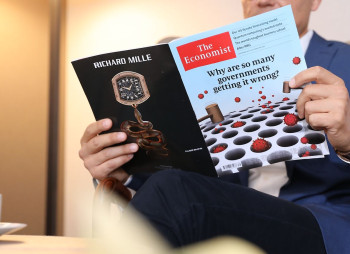Ukraine is in desperate need of foreign capital to revamp its economy and rebuild the country. Beyond the reconstruction bill, which has already surpassed at least $349bn (Hrv12.89trn), private companies are still investing in the vibrant parts of the Ukrainian economy, both for ethical and financial reasons.
In fact, over the coming year or two, the country is gearing up for a $5bn pipeline of foreign investment in the manufacturing space alone, according to Sergiy Tsivkach, CEO of UkraineInvest, the country’s investment promotional agency. Some 25 companies are involved in that figure, including Ireland’s Kingspan Group, which is set to invest €200m ($198.86m).
“That is $5bn-worth of investment in just manufacturing,” says Tsivkach. “There is billions more across other sectors, but at UkraineInvest we are very focused on private investors in industry as this is the most important way to restore the economy and create new jobs.”
Although business sentiment for investment into Ukraine is at its lowest since 2013, 91% of the hundreds of companies in Ukraine’s European Business Association (the country’s largest network for foreign investors) still want to work in Ukraine, while half still have a desire to invest more in the country, despite the ongoing war.
“We already see some investors looking to come in with hundreds of millions of dollars in logistics, tech production and real estate,” said Anna Derevyanko, executive director of the European Business Association, at a recent forum in Barcelona. “The entry price currently is very low in Ukraine, compared with what it could be when the war is over.”
A spanner in the works for Ukraine manufacturing investment
This is all well and good, but one key ingredient is missing for large-scale foreign investment to become a reality in Ukraine: political risk insurance.
“If you are going into Ukraine, especially in a capital-heavy sector such as manufacturing, you need insurance against war damage if you are going to build a facility,” says Tsivkach.
Unfortunately, insurance options are few and far between for foreign investors looking at Ukraine. The private underwriting market is too spooked, while public sector insurers have yet to create a specific programme for the country.
“Ukraine urgently needs strong political will from foreign governments to create a tailored insurance programme,” says Tsivkach. “This is of highest priority in order to rebuild Ukraine. It is 11 out of 10 on the scale of importance. We can’t expect private underwriting, because they have different models of business. It can only come from political agreement and joint agenda, since they can subsidise the premium to make it affordable.”
Despite the lack of certainty surrounding political risk insurance, it is noteworthy that 25 companies still want to invest in Ukrainian manufacturing. “They are assessing the situation, but they have made a decision to invest anyway, and will be looking for insurance as an additional incentive to invest in the country,” says Tsivkach.
“Unlike manufacturing, IT companies need less war insurance, since they are agile and can operate from different cities, or even just have their people work from home. In fact, many no longer have offices, making them far more resilient to shocks. That is why we have seen about 70% of IT companies in Ukraine receive new contracts and new investment – but when it comes to a factory, or a bridge or real estate, it is a very different story.”
Fortunately, international negotiations are under way to create government-sponsored insurance options for investors in Ukraine. With the safety belt of an underwriter, a wave of investment could be unlocked.






